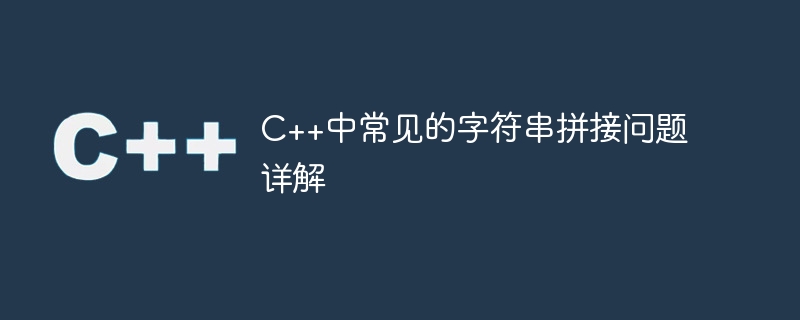

Detailed explanation of common string concatenation problems in C, specific code examples are required
In C programming, string concatenation is a common task. Whether it is simply splicing several strings or complex string operations, you need to master some basic skills and methods. This article will introduce in detail common string concatenation problems in C and provide specific code examples.
#include <iostream>
#include <string>
int main() {
std::string str1 = "Hello";
std::string str2 = "World";
std::string result = str1 + " " + str2;
std::cout << result << std::endl;
return 0;
}In the above code, we define two strings str1 and str2, and use the operator to splice them, and the result is stored in the result variable. Finally, use cout to output the result as "Hello World".
2.1. string::append() function
The string class provides a function named append(), which is used to join a string Append to the end of another string. An example is as follows:
#include <iostream>
#include <string>
int main() {
std::string str1 = "Hello";
std::string str2 = "World";
str1.append(" ");
str1.append(str2);
std::cout << str1 << std::endl;
return 0;
}In the above code, we first use the append() function to append a space string to str1, then append str2, and the final output result is "Hello World".
2.2. string::insert() function
The string class also provides the insert() function, which is used to insert a string at a specified position. An example is as follows:
#include <iostream>
#include <string>
int main() {
std::string str1 = "Hello";
std::string str2 = " World";
str1.insert(5, str2);
std::cout << str1 << std::endl;
return 0;
}In the above code, we use the insert() function to insert str2 into str1 at position 5, and the final output result is "Hello World".
#include <iostream>
#include <sstream>
int main() {
std::stringstream ss;
std::string str1 = "Hello";
std::string str2 = " World";
std::string str3 = "!";
ss << str1 << str2 << str3;
std::string result = ss.str();
std::cout << result << std::endl;
return 0;
}In the above code, we first create a stringstream object ss, and use the stream operator
To sum up, this article introduces common string concatenation problems in C and provides specific code examples. Whether you use the operator, the string splicing function, or the stringstream class, you can perform string splicing operations flexibly. Mastering these methods can help you better deal with string concatenation problems and improve programming efficiency.
The above is the detailed content of Detailed explanation of common string concatenation problems in C++. For more information, please follow other related articles on the PHP Chinese website!




